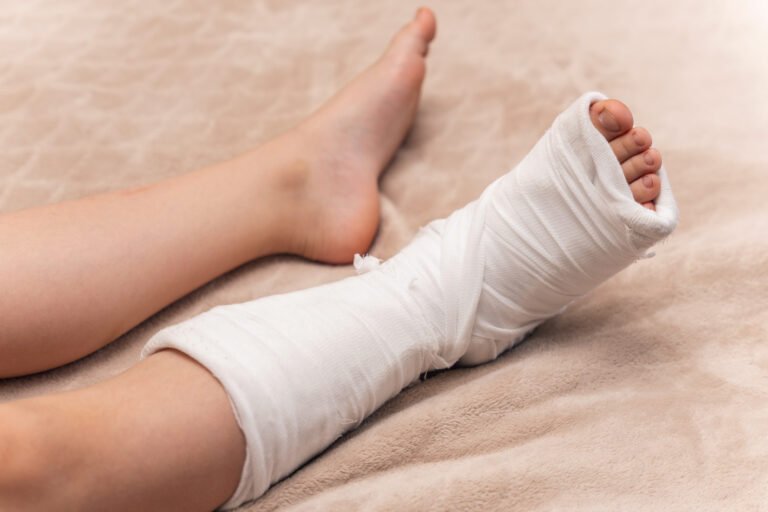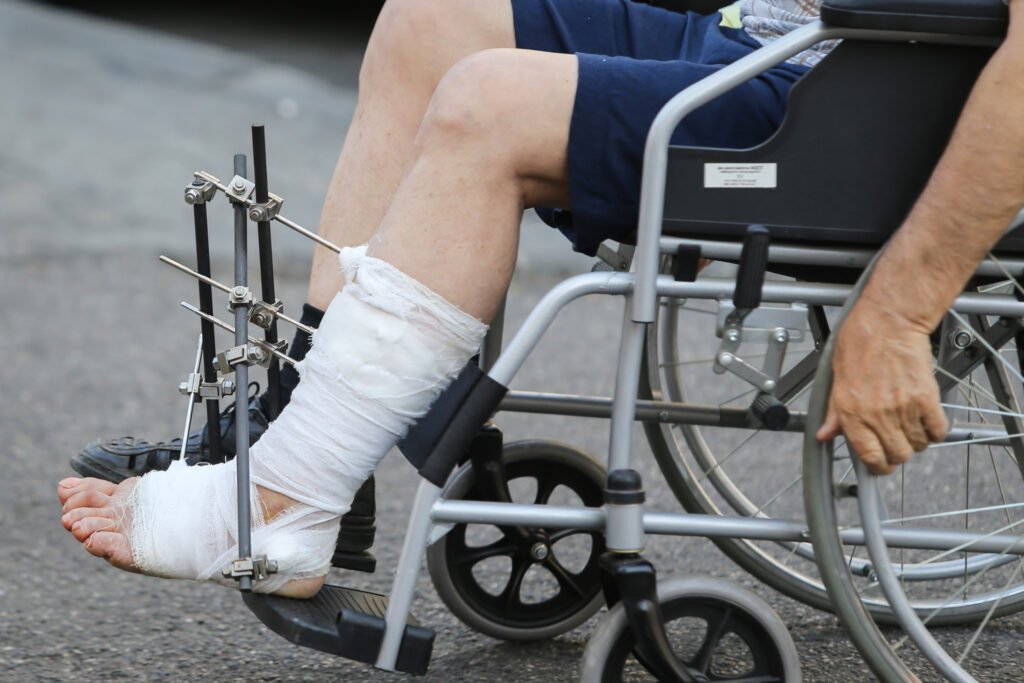Leg Injury Claim Specialists
No-win, No-fee claims
Learn how a No Win No Fee solicitor could help you make a leg injury claim.
Excellent Reviews On

Leg Injury Claim Specialists
100% No Win No Fee
Learn how a No Win No Fee solicitor could help you make a leg injury claim.
Excellent Reviews On
As featured in:




No Win No Fee Leg Injury Claim Guide
Suffering a personal injury which wasn’t your fault can have life-changing consequences, from affecting your mobility to meaning you’re unable to work. Continue reading to learn how you could be eligible to make a leg injury claim with us at No Win No Fee Solicitors Co.
Key Takeaways
- You could make a No Win No Fee claim if your case satisfies the eligibility criteria.
- Generally, most compensation claims must be made within 3 years of the accident.
- Leg injuries can be sustained in road traffic accidents, medical negligence cases, public liability claims or even as criminal injuries.
- Evidence will be needed to prove liability.
- Compensation can encompass the physical, psychological and economic impacts of your leg injury.
Get In Touch
- Call us on 0333 091 8598
- Fill out our online claim form
- Use our live chat

Can I Make A Leg Injury Claim With A No Win No Fee Solicitor?
You could make a leg injury claim with a No Win No Fee solicitor of ours if your case fulfils the eligibility requirements. We can determine this by proving the three components of negligence:
- Someone owed you a duty of care
- The person who owed you this breached it
- Their breach led to your injury
The duty of care you are owed depends on the situation in which you suffered your leg injury. But generally, it is a legal responsibility to ensure your reasonable safety.
As well as ensuring your claim satisfies the eligibility requirements, you must also ensure your claim is started within the permitted time limit. Established in the Limitation Act 1980, generally, most claimants have 3 years from the date of the accident to start a claim.
This limitation period varies in criminal injury claims, where most claimants have 2 years to make a claim.
If you’d like to discuss your potential leg injury claim, you can contact us today.
Why use us?
Free Consultation
We offer a free consultation to anyone looking to make a claim
No win, no fee
Claim experts
We use solicitors who have handled thousands of claims

What Is A No Win No Fee Solicitor?
A No Win No Fee solicitor is a solicitor who offers their legal services under a type of No Win No Fee contract.
Our solicitors specifically offer a Conditional Fee Agreement (CFA).
These types of contracts provide a beneficial way of instructing legal representation, as it means you wouldn’t be required to make any upfront payments for the solicitor to begin or continue working on your case.
It also means that if your claim isn’t successful, you wouldn’t need to pay a penny for your solicitor’s services.
Instead, if your claim were successful, a small fee would be payable from your compensation to your solicitor at the end of your claim. This is referred to as a success fee. This fee is limited under the law to ensure that claimants receive the bulk of their compensation.
To learn more about how a No Win No Fee agreement works, you can contact us today. Our advisors are available to discuss any questions you may have about your own leg injury claim.
How Can No Win No Fee Solicitors Co Help Me?
Our specialist solicitors here at No Win No Fee Solicitors Co. have decades of experience advocating for claimants just like yourself. As well as the benefits of utilising a CFA, by choosing to work with one of our solicitors, you could expect:
- Support through every step of the claim process
- Working closely with you to develop a recovery plan that suits your needs
- Experts in leg injury claims
- Help with gathering evidence
- Arranging an independent medical assessment where required
- Ensuring your claim is started within the time limits
- Helping you to claim through the Criminal Injuries Compensation Authority (CICA) if needed
- Frequent and regular updates about your claim
- Advocating on your behalf to achieve a settlement amount that is reflective of the impact of your injuries
Our solicitors are committed to providing you with the highest level of legal advice and support. Get in touch with us today to learn more about how they could help you with your leg injury claim.
How Are Leg Injuries Caused?
Leg injuries can be caused in a variety of accidents. Some examples include:
Road Traffic Accidents
An example of how you might sustain a leg injury from a road traffic accident could be if:
- You’re cycling on the road when suddenly you are hit by a car that was speeding and distracted by their phone. This causes you a severe leg fracture and a back injury.
Accidents At Work
Accidents at work might result in a leg injury claim if, for example:
- Your employer fails to provide your colleague with adequate forklift training, yet continues to assign them to work on the forklift. Unfortunately, as your colleague was unsure how to operate the brakes, you ended up pinned against the wall and the forklift truck. This caused a broken leg.
Public Liability Claims
A public liability accident could result in a leg injury if:
- You’re walking on a public footpath when your foot becomes stuck in a broken, poorly maintained paving stone. You tripped, resulting in a broken ankle and very serious leg injuries, including multiple fractures.
Medical Negligence
You might have the grounds to make a leg injury claim as a result of medical negligence if, for example:
- A doctor treats you in a hospital after an operation, but fails to notice your symptoms associated with sepsis. As a result, the sepsis becomes more aggressive and spreads to your leg, necessitating an amputation to prevent further infection spread. This amputation was entirely preventable, avoidable and ultimately resulted in you suffering unnecessary harm.
Criminal Injuries
Physical altercations can often result in a range of different injuries, but a leg injury might be sustained if:
- You are out on a Friday evening when a physical brawl starts, and suddenly someone punches you, causing you to fall to the ground. Whilst on the ground, other perpetrators begin kicking you, resulting in a fractured leg and soft tissue injuries.
The examples we have provided are by no means exhaustive, so if your case particulars differ, please get in touch with us today. Our advisors can provide you with a claim validity check, completely free of charge.
What Compensation Can I Get For A Leg Injury?
The amount of compensation you could receive in a successful leg injury claim can be calculated by considering two heads of loss, called general and special damages.
General damages are compensation for the physical and psychological impacts of your leg injury. It can take into consideration the pain and suffering caused by your injuries.
When this head of claim is being calculated, professionals might refer to the Judicial College Guidelines (JCG) for assistance. This is a framework offering compensation bracket guidelines for various injury types.
The compensation calculator below uses the figures listed within the JCG. Please only use them as guidelines.
Compensation Bracket: 0.00
What Factors Impact The Value Of A Leg Injury Claim?
The impact of your leg injury will directly affect the value of your claim. For example, if you experienced a severe leg injury that requires years of healing and further surgery, this will be considered and used to help value your claim.
As well as this, if your injuries have had a financial impact, then you might be able to claim special damages, as briefly mentioned above. This could include costs such as:
- Lost earnings if you’ve had to take time off to recover
- Travel costs, such as taxi costs to and from the hospital for treatments
- Medical expenses such as prescription costs or reconstructive surgery expenses
- Care costs, either professional or from family
However, in order to claim this as part of your compensation, you must hold evidence which proves these financial losses. This might be comprised of:
- Payslips to show a loss of earnings
- Receipts for travel costs
- Medical invoices for any expenses incurred
We could help you compile this evidence as part of the services offered by our solicitors. Contact us today to learn more.
How Can A Solicitor Help Me To Prove A Leg Injury Claim?
Our solicitors could help you with gathering evidence to strengthen the basis of your claim. This might be documentation that can help demonstrate how someone else’s negligent actions led to your leg injury and the severity of the injury.
Your evidence might be made up of the following:
- Medical records, such as your GP record, to show any diagnoses, prescriptions or treatments received following your accident
- Workplace accident report book
- CCTV or dashcam footage if the accident was caught on camera
- Contact details of anyone who may have witnessed the accident, from whom we can later gather a witness statement.
- Police or emergency reports
- Public place accident report book
We understand that it can feel overwhelming to begin your claim, which is why if you choose to work with us, one of our solicitors could help you with evidence gathering to strengthen your claim.
Contact us today to learn more about what evidence would be useful in your leg injury claim.
Contact Our No Win No Fee Solicitors
To explore how to start your own leg injury claim, you can contact one of our advisors. They can offer you free advice for your claim and could also connect you with one of our solicitors who could offer to represent you on a No Win No Fee basis.
Get In Touch
- Call us on 0333 091 8598
- Fill out our online claim form
- Use our live chat
More Information
Why not read our other guides about:
- How to make a burn injury claim
- Dog bite compensation claims
- Start your eye injury claim
Helpful External Resources
- Eligibility requirements to apply for Statutory Sick Pay from GOV.UK
- NHS advice about broken legs
- When you should report a workplace incident from the Health and Safety Executive
Thank you for reading our leg injury claims guide.